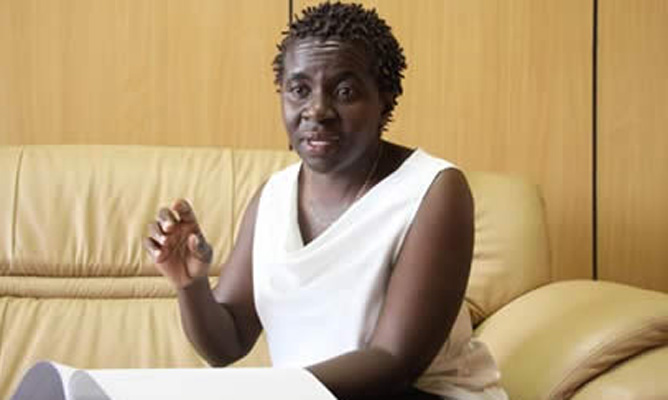
Harare West legislator Jessie Majome says the censorship board is concerned with controlling political space, leaving information considered immoral and misappropriate finding its way into national radio and television.
By Moses Mugugunyeki
Majome said there was plenty of information that promotes sexual exploitation of children on radio and television.
The legislator while contributing to a child marriages debate in Parliament two weeks ago lashed out at Jah Prayzah’s video Eriza, saying it was sending wrong signals to some men.
In a recent interview with The Standard Style, the outspoken women rights activist laid the blame on the censorship board, which she said was spending its energy on controlling the political space.
“They [censorship board] are more interested in controlling the political space, as well as being obsolete [in terms with their parent Act] obscure and ineffectual,” she said.
The censorship board, which operates under the Ministry of Home Affairs, was established as a result of the Censorship and Entertainment Control Act. The board among other things regulates and controls public exhibition of films, production and dissemination of information on national radio and television.
In 2012 the Censorship Board banned the play, No Voice No Choice, which was directed and produced by Tafadzwa Muzondo saying it was “too direct” as well as being “inciteful and against the spirit of national healing.”
- Chamisa under fire over US$120K donation
- Mavhunga puts DeMbare into Chibuku quarterfinals
- Pension funds bet on Cabora Bassa oilfields
- Councils defy govt fire tender directive
Keep Reading
Recently the board denied permission to a film company to distribute the documentary Democrats in Zimbabwe. The documentary explores the drawn-out and often fractious negotiations between Zanu-PF party and MDC in the 2009-2013 coalition government, as they tried to reach a consensus on the drafting of a new Consititution.
But Majome said sexual depiction of children was rife on national radio and television, which is one area where the censorship board had been found wanting.
“I definitely object to that Eriza video because of its unfortunate and harmful effects. I’m provoking us to examine our consciences as a society and re-look at it across our spectrum as politicians, artists, parents and institutions,” Majome said.
“My role as a leader is to influence thinking and therefore policymaking. It’s up to the authorities and artists involved to take the necessary action in remedying this not thoroughly thought out mis-step.”
The legislator also took a swipe at the Chicken Slice advert that appears on ZTV which she said violated children’s rights.
“This applies all the more to the Chicken Slice advert of the son-in-law who brings his father-in-law junk food and in his gratitude he offers him, impromptu, a young sister of the son in-law’s wife. That one must just be pulled off air without negotiation as child pledging, forced and child marriage are criminal offences in terms of Section 3(1)(l) of the Domestic Violence Act Chapter 5:16,” she said.
Majome’s sentiments were also echoed by child right activist Nyaradzo Mashayamombe who said artists had a moral obligation to protect the interests of society.
“The issue about musicians using school uniforms in sexual suggestive dances, like the one in Jah Prayzah’s video, send a wrong signal to girls in school to be sexy and wear short uniforms,” Mashayamombe said.
“It then goes without saying that indeed, as artists, we have a moral obligation to protect the interests of our society and prevent human rights violations.”
Mashayamombe said musicians should realise that they were role models and their conduct, including dressing, influences society, especially young people.
“Artists should use lyrics that are constructive and promote dressing that also protects children,” she said.
However, Jah Prayzah’s manager Keen Mushapaidze on Thursday told our sister paper NewsDay that the Eriza video could not be used as a scapegoat for perverts’ deviant ways.
“I do not consider normal, a person, who would actually say he was prompted by the video to commit a crime, of maybe, dating young school girls,” Mushapaidze said. “If someone is mischievous, he is just ill-behaved.”
Mushapaidze said it was regrettable that, while they had done their best on the video to excite their fans, it had been interpreted negatively.
“Sometimes we might be thinking as artistes that we have done our best with script for our fans, but not knowing how they will interpret it and when such cases arise, like in this case, as professionals, we stand to be guided and we take advice and criticism for our future projects.”
Majome said the only way to address issues to do with domestic violence and children’s rights was to come up with a vibrant policy.
“I’m still convinced that reviving the National Gender-Based Violence Strategy 2012 -2015 that the Women and Gender ministry slept on until it expired without raising a single finger on it is key,” Majome said.
She said she will be reinstating a motion on that for the second time to push for the revival of the National Gender-Based Violence Strategy and an action plan crafted with stakeholders.
The legislator said the Gender Commission was a great opportunity to wake up the Women and Gender ministry from its slumber.











